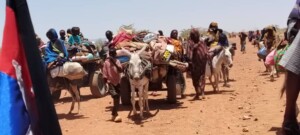World marks International Day for the Elimination of Sexual Violence in Conflict
Marking the sixth annual International Day for the Elimination of Sexual Violence in Conflict today, the UN Secretary-General António Guterres voiced solidarity with survivors, vowing to listen to them and act on their experiences and decisions
 A woman living in Kassab Camp for Internally Displaced People in Kutum, North Darfur, expresses her sorrow over the increase in rapes in the area (UN Photo / Albert González Farran)
A woman living in Kassab Camp for Internally Displaced People in Kutum, North Darfur, expresses her sorrow over the increase in rapes in the area (UN Photo / Albert González Farran)
Marking the sixth annual International Day for the Elimination of Sexual Violence in Conflict today, the UN Secretary-General António Guterres voiced solidarity with survivors, vowing to listen to them and act on their experiences and decisions.
“Sexual violence in conflict is a brutal crime, mainly perpetrated against women and girls, but also affecting men and boys. It reverberates throughout communities and societies, perpetuating cycles of violence and threatening international peace and security,” Guterres says in a video address to mark the occasion.
‘On this International Day for the Elimination of Sexual Violence in Conflict, we stand in solidarity with survivors. We vow to listen to them and act on their experiences and decisions’ – UN Secretary-General António Guterres
“As the Covid-19 pandemic rages through regions of the world that are affected by armed conflict, survivors confront even greater challenges. Reporting crimes may be difficult; shelters and clinics may be closed. I commend frontline staff who are finding ways to support those affected despite lockdowns and quarantines,” the Secretary-General says.
Video address by UN Secretary-General António Guterres
On this International Day for the Elimination of Sexual Violence in Conflict, we stand in solidarity with survivors. We vow to listen to them and act on their experiences and decisions. We must prevent and end these crimes; place survivors at the centre of our response; hold perpetrators accountable; and expand support for all those affected,” Guterres concludes.
2020 Event
A virtual event took place at 10:00 (EST), co-hosted by the Office of the SRSG on Sexual Violence in Conflict, the Office of the SRSG for Children and Armed Conflict, and the Permanent Mission of Argentina to the United Nations. The purpose of this event was to outline a number of implications and consequences related to the effects of Covid-19 on the lives of the survivors, as well as on the delivery of the CRSV mandate and the work of the UN system as a whole.
Virtual event (UN Video)
Sudan
Globally, gender-based violence (GBV) affects one in three women in their lifetime. In Sudan, decades of war, particularly in Darfur and the Two Areas, allowed GBV to become a commonplace occurrence, and despite recent ceasefires with armed movements and the transfer of power to a transitional government in Khartoum, reports of rape and GBV continue to reach Radio Dabanga almost every day.
On the occasion of International Women's Day on March 8, Prime Minister Abdallah Hamdok assured his government’s commitment “to end all aspects of institutional and social discrimination against women, in order to ensure their rights in all parts of the country.
“Achieving equality is one of the basic principles for making a successful and sustainable peaceful transition in Sudan,” he said. “The participation of women in all its institutions should be enhanced in a way that reflects their great role in the transition”.
Radio Dabanga’s editorial independence means that we can continue to provide factual updates about political developments to Sudanese and international actors, educate people about how to avoid outbreaks of infectious diseases, and provide a window to the world for those in all corners of Sudan. Support Radio Dabanga for as little as €2.50, the equivalent of a cup of coffee.












 and then
and then